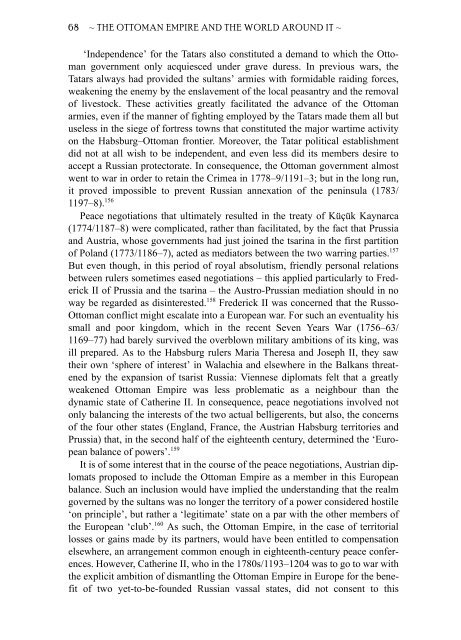The Ottoman Empire and the World Around It - Course Information
The Ottoman Empire and the World Around It - Course Information
The Ottoman Empire and the World Around It - Course Information
You also want an ePaper? Increase the reach of your titles
YUMPU automatically turns print PDFs into web optimized ePapers that Google loves.
68 ~ THE OTTOMAN EMPIRE AND THE WORLD AROUND IT ~<br />
‘Independence’ for <strong>the</strong> Tatars also constituted a dem<strong>and</strong> to which <strong>the</strong> <strong>Ottoman</strong><br />
government only acquiesced under grave duress. In previous wars, <strong>the</strong><br />
Tatars always had provided <strong>the</strong> sultans’ armies with formidable raiding forces,<br />
weakening <strong>the</strong> enemy by <strong>the</strong> enslavement of <strong>the</strong> local peasantry <strong>and</strong> <strong>the</strong> removal<br />
of livestock. <strong>The</strong>se activities greatly facilitated <strong>the</strong> advance of <strong>the</strong> <strong>Ottoman</strong><br />
armies, even if <strong>the</strong> manner of fighting employed by <strong>the</strong> Tatars made <strong>the</strong>m all but<br />
useless in <strong>the</strong> siege of fortress towns that constituted <strong>the</strong> major wartime activity<br />
on <strong>the</strong> Habsburg–<strong>Ottoman</strong> frontier. Moreover, <strong>the</strong> Tatar political establishment<br />
did not at all wish to be independent, <strong>and</strong> even less did its members desire to<br />
accept a Russian protectorate. In consequence, <strong>the</strong> <strong>Ottoman</strong> government almost<br />
went to war in order to retain <strong>the</strong> Crimea in 1778–9/1191–3; but in <strong>the</strong> long run,<br />
it proved impossible to prevent Russian annexation of <strong>the</strong> peninsula (1783/<br />
1197–8). 156<br />
Peace negotiations that ultimately resulted in <strong>the</strong> treaty of Küçük Kaynarca<br />
(1774/1187–8) were complicated, ra<strong>the</strong>r than facilitated, by <strong>the</strong> fact that Prussia<br />
<strong>and</strong> Austria, whose governments had just joined <strong>the</strong> tsarina in <strong>the</strong> first partition<br />
of Pol<strong>and</strong> (1773/1186–7), acted as mediators between <strong>the</strong> two warring parties. 157<br />
But even though, in this period of royal absolutism, friendly personal relations<br />
between rulers sometimes eased negotiations – this applied particularly to Frederick<br />
II of Prussia <strong>and</strong> <strong>the</strong> tsarina – <strong>the</strong> Austro-Prussian mediation should in no<br />
way be regarded as disinterested. 158 Frederick II was concerned that <strong>the</strong> Russo-<br />
<strong>Ottoman</strong> conflict might escalate into a European war. For such an eventuality his<br />
small <strong>and</strong> poor kingdom, which in <strong>the</strong> recent Seven Years War (1756–63/<br />
1169–77) had barely survived <strong>the</strong> overblown military ambitions of its king, was<br />
ill prepared. As to <strong>the</strong> Habsburg rulers Maria <strong>The</strong>resa <strong>and</strong> Joseph II, <strong>the</strong>y saw<br />
<strong>the</strong>ir own ‘sphere of interest’ in Walachia <strong>and</strong> elsewhere in <strong>the</strong> Balkans threatened<br />
by <strong>the</strong> expansion of tsarist Russia: Viennese diplomats felt that a greatly<br />
weakened <strong>Ottoman</strong> <strong>Empire</strong> was less problematic as a neighbour than <strong>the</strong><br />
dynamic state of Ca<strong>the</strong>rine II. In consequence, peace negotiations involved not<br />
only balancing <strong>the</strong> interests of <strong>the</strong> two actual belligerents, but also, <strong>the</strong> concerns<br />
of <strong>the</strong> four o<strong>the</strong>r states (Engl<strong>and</strong>, France, <strong>the</strong> Austrian Habsburg territories <strong>and</strong><br />
Prussia) that, in <strong>the</strong> second half of <strong>the</strong> eighteenth century, determined <strong>the</strong> ‘European<br />
balance of powers’. 159<br />
<strong>It</strong> is of some interest that in <strong>the</strong> course of <strong>the</strong> peace negotiations, Austrian diplomats<br />
proposed to include <strong>the</strong> <strong>Ottoman</strong> <strong>Empire</strong> as a member in this European<br />
balance. Such an inclusion would have implied <strong>the</strong> underst<strong>and</strong>ing that <strong>the</strong> realm<br />
governed by <strong>the</strong> sultans was no longer <strong>the</strong> territory of a power considered hostile<br />
‘on principle’, but ra<strong>the</strong>r a ‘legitimate’ state on a par with <strong>the</strong> o<strong>the</strong>r members of<br />
<strong>the</strong> European ‘club’. 160 As such, <strong>the</strong> <strong>Ottoman</strong> <strong>Empire</strong>, in <strong>the</strong> case of territorial<br />
losses or gains made by its partners, would have been entitled to compensation<br />
elsewhere, an arrangement common enough in eighteenth-century peace conferences.<br />
However, Ca<strong>the</strong>rine II, who in <strong>the</strong> 1780s/1193–1204 was to go to war with<br />
<strong>the</strong> explicit ambition of dismantling <strong>the</strong> <strong>Ottoman</strong> <strong>Empire</strong> in Europe for <strong>the</strong> benefit<br />
of two yet-to-be-founded Russian vassal states, did not consent to this


